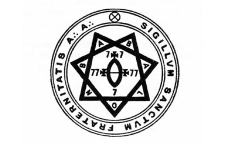Gnosticism: Difference between revisions
m (Text replacement - "{{Thelema|expanded}}" to "{{Thelema}}") |
m (Text replacement - "{{Thelema topics}}" to "{{Sa-Thelema}}") |
||
| Line 14: | Line 14: | ||
== Sources == | == Sources == | ||
<references group="Source" /> | <references group="Source" /> | ||
{{Thelema | {{Sa-Thelema}} | ||
{{Footer}} | {{Footer}} | ||
Latest revision as of 21:20, 20 February 2025
Gnosticism (from Ancient Greek: γνωστικός, romanized: gnōstikós, Koine Greek: [ɣnostiˈkos], 'having knowledge') is a collection of religious ideas and systems that coalesced in the late 1st century AD among Jewish and early Christian sects. These various groups emphasized personal spiritual knowledge (gnosis) above the proto-orthodox teachings, traditions, and authority of religious institutions. Gnostic cosmogony generally distinguishes between a supreme, hidden God and a malevolent lesser divinity (sometimes associated with Yahweh of the Old Testament), who is responsible for creating the material universe. Consequently, Gnostics considered material existence flawed or evil and held the principal element of salvation to be direct knowledge of the hidden divinity attained via mystical or esoteric insight. Many Gnostic texts deal not with concepts of sin and repentance but with illusion and enlightenment.
Gnostic writings flourished among Christian groups in the Mediterranean around the second century, when the Fathers of the early Church denounced them as heresy. Efforts to destroy these texts proved largely successful, resulting in the survival of very little writing by Gnostic theologians. Nonetheless, early Gnostic teachers such as Valentinus saw their beliefs as aligned with Christianity. In the Gnostic Christian tradition, Christ is seen as a divine being who has taken human form to lead humanity back to recognizing its own divine nature. However, Gnosticism is not a single standardized system, and the emphasis on direct experience allows for various teachings, including distinct currents such as Valentinianism and Sethianism. In the Persian Empire, Gnostic ideas spread as far as China via the related movement Manichaeism, while Mandaeism, which is the only surviving Gnostic religion from antiquity, is found in Iraq, Iran, and diaspora communities. Jorunn Buckley posits that the early Mandaeans may have been among the first to formulate what would go on to become Gnosticism within the early Jesus movement.
For centuries, most scholarly knowledge about Gnosticism was limited to the anti-heretical writings of early Christian figures such as Irenaeus of Lyons and Hippolytus of Rome. There was a renewed interest in Gnosticism after the 1945 discovery of Egypt's Nag Hammadi library, a collection of rare early Christian and Gnostic texts, including the Gospel of Thomas and the Apocryphon of John. Elaine Pagels has noted the influence of sources from Hellenistic Judaism, Zoroastrianism, and Platonism on the Nag Hammadi texts. Since the 1990s, the category of Gnosticism has come under increasing scrutiny from scholars. One such issue is whether Gnosticism ought to be considered one form of early Christianity, an interreligious phenomenon, or an independent religion. Going further than this, other contemporary scholars such as Michael Allen Williams[7] and David G. Robertson contest whether "Gnosticism" is still a valid or useful historical category at all or if, instead, it was simply a term of art of proto-orthodox heresiologists for a disparate group of contemporaneous Christian groups.
- More information is available at [ Wikipedia:Gnosticism ]
Sources
| Ordo Templi Orientis | |
|---|---|
| Outline of spirituality ● List of occult terms ● List of occultists ● Outline of spirituality |
|---|
|
- More information is available at [ Wikipedia:Gnosticism ]
Chat rooms • What links here • Copyright info • Contact information • Category:Root

